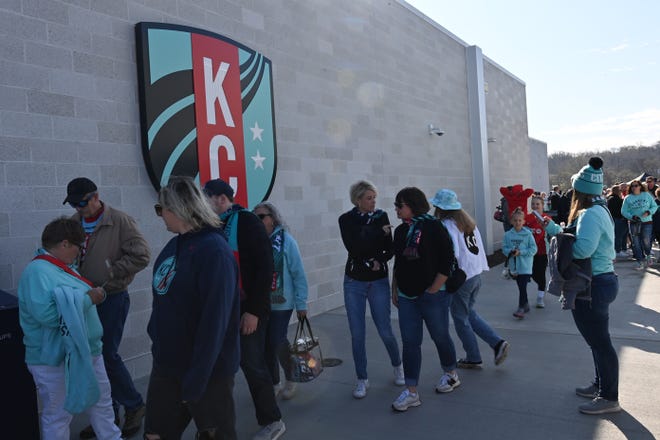KANSAS CITY, Mo. — The bar is forever higher.
With the opening of CPKC Stadium on Saturday, the women's professional team finally has a stadium built just for them. It is not already occupied by a men's team, shared with a university, or used as part of a regional complex. It was designed to their specifications and includes their own locker room. It has everything you could want in a men's team stadium, including more than 10,000 seats, luxury boxes, and high-end concessions.
It signals to the world that the women's game and the athletes who play it are not going anywhere and should be treated the same as professional athletes.
“You can't unsee what we've done. And once you see it, it changes other people's vision and other people's expectations of what's right,” said Kansas City's current co-owner. Angie Long told USA TODAY Sports on Friday, the day before the opening of CPKC Stadium on the city's riverfront.
“Not many people now ask why they need their own stadium,” Long added. “Because they see it and understand it.”
A women's professional league has existed in the United States for about 30 years. But for far too long, public acceptance of the WNBA and NWSL, and their predecessors, has been reluctant. At most.
They were forced to play on high school grounds and other facilities lacking basic facilities. Like a locker room. They were driven into the hinterlands, far from the cities they were supposed to represent. Their own owners treated them like charity projects rather than worthy investments.
Even the two stadiums previously built for women's teams as primary tenants were, at least initially, small and not accommodating for top-level professional men's teams.
The message was clear. “We are going to let you play, little girl.'' Be grateful for what you have.
Michelle Akers, a member of the inaugural U.S. Women's National Team in 1985 and World Cup champions in 1991 and 1999, said during Saturday's pregame celebration. .

Thankfully, that is changing. Interest in women's sports is skyrocketing, and female athletes are becoming more vocal about their refusal to accept injustice. Additionally, both the NWSL and WNBA are seeing an influx of owners who recognize that supporting women's sports is more than just a noble cause. You need to make a lot of money, but that means treating women like professionals.
“When we announced we were going to build a stadium, reporters asked, 'Why can't we play at Children's Mercy Park?'” Long said, referring to the home of Major League Soccer team Sporting KC. “And my answer was, 'Why don't professional teams deserve to have their own stadium, their own home, their own place to play?'
When you look around CPKC Stadium and see the players' reactions to it, the answer seems obvious. It took until now for that to happen because it's so ridiculous.
When Current got a first look at the new stadium's locker room, Michelle Cooper was so excited she jumped across the floor. Lo LaBonta, who spent half of his 10-year career in Kansas City, joked: Do you want to take a shower? Is this strange?
The signage, colors, and products sold are all current. Nothing is borrowed or given away. They don't stay in someone else's house or are part-time tenants, and they have to take everything with them and make sure they don't leave any trace of themselves after the game.

This is their home and their permanent residence. Everything there is for them and belongs to them.
opinion:Men's professional teams have received subsidies for many years. The time has come for women to get it too.
“This is a game changer,” NWSL Commissioner Jessica Berman said. “I think it will have a bigger impact than anyone can imagine.”
As Long said, once you see CPKC Stadium, you can't miss it. We also can't ignore the question of why women's teams don't deserve their own space over men's teams.
One of the active players who scored in the 5-4 win over the Portland Thorns was 16-year-old Alex Pfeiffer. Unlike the veterans, who aren't that far removed from the days of substandard facilities, Pfeiffer will play her entire career in a stadium where there is always at least one stadium built specifically for women's teams.
It may not seem like it. But for women's sports, this is a groundbreaking change.
“This is a game-changer for women's football,” said current coach Vlatko Andonovski. “This is the beginning of change.”
Something long awaited.
Follow USA TODAY sports columnist Nancy Armour on social media @nrarmour.


